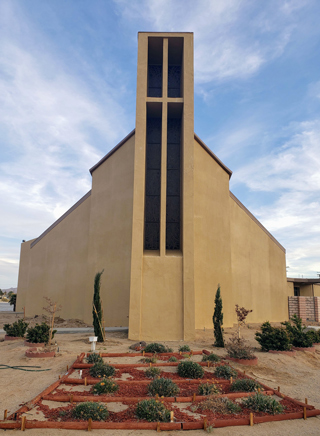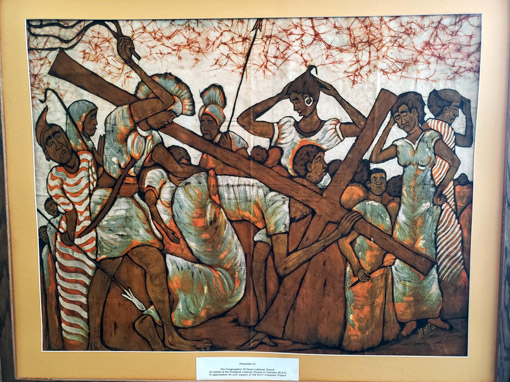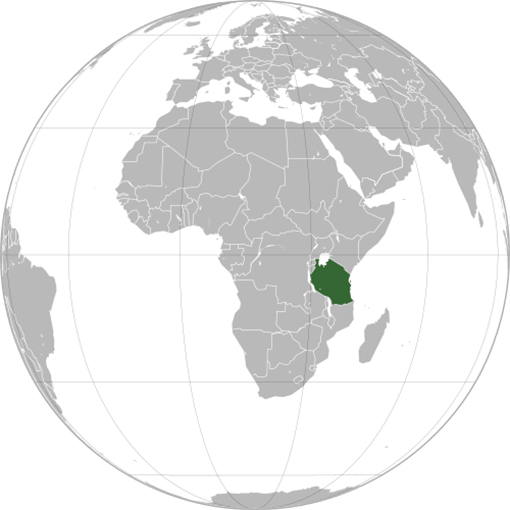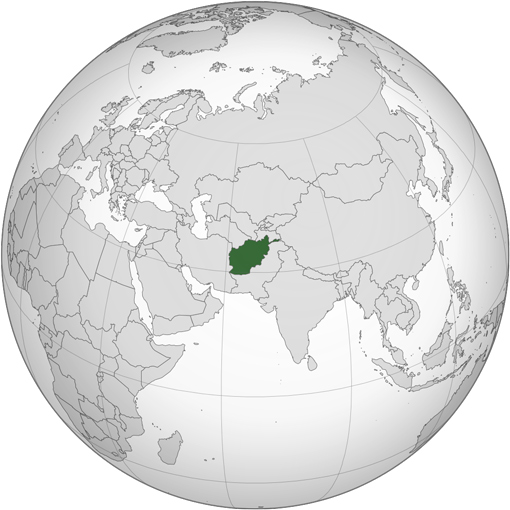[Note from Editor Bill Moberly: Grace Lutheran Church in Ridgecrest has a long history in global mission. ALWM has been working with the mission team at Grace for more than a decade. The mission team recently hosted a Harvest Focus workshop in order to renew and perhaps restructure their global outreach. I interviewed Pastor Kris Madsen recently for this edition of CGM.
Grace Lutheran Church


Grace Lutheran Church, Ridgecrest, California

A place for you to be nurtured and equipped by God’s grace through His Word and Sacraments.
Editor: How is the importance of the global Great Commission demonstrated in your congregation?
Pastor Kris: Historically, global mission has been a huge and natural part of ministry at Grace Lutheran Church; this is in large part due to the pastors at Grace. The second pastor of Grace, Rev. Robert Johnson, was called fresh from the mission fields of Tanganyika (modern day Tanzania) in 1959. In addition to Rev. Johnson’s own experiences on the mission field, the congregation was further shaped by visits from Rev. Johnson’s colleague in Tanzania, Dr. David Simonson, who also happened to be a nephew of one of Grace’s charter members.
Grace’s connection with the Evangelical Lutheran Church of Tanzania (ELCT) was further strengthened in the 80s with a partnership through Lutheran World Relief. The ELCT was experiencing significant growth and didn’t have the tech base to streamline the collecting, analyzing, and reporting of membership and financial data. Rev. Ron Jetter realized that Grace was in a unique position to help the ELCT with this, and so Grace sent two sons of the congregation to Tanzania on two separate occasions to help with this project.

ELC Tanzania sent this gift to Grace Lutheran Church in appreciation for tech support provided

Tanzania – global view
Also in the 80s, another pastor from Grace and his family caught the call for global missions and prepared to be sent to Peru. All of that pastor’s passions and preparations for global missions was caught by a young couple in the congregation; that couple would train to become missionaries to Muslims in Afghanistan through an organization called Frontiers. This couple is still supported by the congregation to this day as they now work to train and equip others for mission to the Muslim world.

Afghanistan – global view

Kogodus |noun|
A religious organization or congregation that meets in a particular location.
(Source: https://en.wiktionary.org/wiki/kogudus)
Another member of the congregation caught the vision and passion for global mission from Rev. Don Swenson, who had been actively involved with a ministry called Kogodus; this member became actively involved with what would become Eastern European Missions Network (EEMN) and really took the torch in leading the congregation in its global mission efforts and communications.
Editor: How do you fund your mission support and how do you choose who to support?
Pastor Kris: Our funding for missions comes out of our budget; as members are made aware of our mission partners, they are then encouraged to further support these ministry partners at a personal level. Grace spends 10% of its budget on global missions and local outreach, divided between approximately 16 partners, including the couple identified above training up missionaries to the Muslim world. All of these ministries have ended up on our list because of personal contacts and engagements that Grace has had over the years.
From time to time when special requests are made by our mission partners, we may hold a special collection above and beyond our budgeted giving. This past year we had two such requests: one request was for SON Network (Spiritual Orphans Network, formerly Eastern European Missions Network) to support their Ukrainian Refugee Relief efforts. The other request was from our missionary couple; the wife needed to have knee replacement surgery, and so we coordinated a dinner and dessert auction for them. With the funds raised through the dinner event together with donations collected through Thrivent’s online fundraising tool, we were able to raise enough money to cover the cost of the surgery plus the needed physical therapy that followed.
Editor: Do you focus on collaboration in ongoing partnerships, or is the emphasis on simply dispensing benevolences?
Pastor Kris: Because the list of mission support dollars to has become so large (large, at least, for a congregation our size), maintaining any sort of meaningful relationship with all these 16 ministry partners has become challenging to say the least. In most cases, we have become more of a dispensary of funds than an actual partner and collaborator in ministry. Furthermore, because we have such a long list, the amount of money we send doesn’t make that big of an impact for those ministries we are supporting. For this reason, our leadership will soon be undertaking an effort to pare down the number of ministries we support so we can build more meaningful relationships and make a bigger impact with those agencies we decide to continue supporting.
The task of paring down the list of ministries we support is going to be a challenging conversation to have because of the congregation’s history with each of them and, what’s more, each of these ministries are deserving of support.
Editor: What would you say is an important question for pastors and mission team leaders at this time?
Pastor Kris: I think that it is important for pastors and mission teams to consider what kind of an impact we actually have with our ministry partners and what the quality of those relationships are. The dispensing of funds is all well and good – and is even needed by those receiving the funds – but I think we have to ask if this, in and of itself, actually builds up the body of Christ. From my own perspective and experience, I would say that merely being a dispensary of funds keeps these relationships at arm’s length so that there really isn’t that much of a relationship there at all. What I have further observed is that, because these relationships are so thin, the congregation becomes increasingly ambivalent about these relationships, and consequently its passion for global missions slowly dies.
Editor: Are short-term mission trips an important part of your global mission program? Do you encourage members to go serve on mission trips?What is generating the most interest and involvement?
Pastor Kris: I’ll be very honest… we are in a rebuilding process because our key movers and shakers for global missions moved out of the area just as the congregation was entering an interim period. This created a void in this part of the church’s ministry. In an effort to rekindle our passion for global mission, we have very recently re-organized our missions team. That said, in recent times, our short-term mission trips were youth-oriented and stayed relatively local, i.e. serving at the L.A. Rescue Mission. What we are presently working on is a movement toward intergenerational mission opportunities, rotating between domestic and international trips.
An important part of this rebuilding process was hosting a Harvest Focus Workshop with Rev. Bill Moberly from ALWM. This workshop laid a biblical foundation for why it’s important that we re-focus on missions, provided useful insights as to what an intentional, well-rounded missions ministry looks like, and practical steps for creating such a ministry.
Editor: How do you share with the congregation what you are doing and who you support?
Pastor Kris: In order to keep our ministry partners in front of the congregation beyond the one time per year that the budget is reviewed and voted upon, we began doing what we call Spotlight on Missions. Each month we choose a mission partner to highlight. What that looks like is including the selected mission partner on our announcement slideshow for the entire month with a brief description of the ministry. Moreover, one of the Sundays during that month (usually the second or third Sunday depending on schedules) one of our Missions Team members will get up, say a few words and show a brief video about the particular ministry.






